What Are the Essential Labeling Tips for New Label Maker Users?These label makers are wonderful gadgets that make the work of arranging things easier and convenient. However, for the first time users, they might struggle to identify the various buttons and options available. To assist you to make the most of your label maker, we have come up with a list of greatest essential labeling tips to follow as follows:

Understand
When you are ready to label, make sure you spent some moments exploring the features of your label maker. This post aims at looking at each model, its functionalities, and staple characteristics. How to use this equipment should be well understood by going through the manual provided carefully. To add more points about looking for instructions on how to perform the basics, emphasize that tutorial or videos are helpful viewing aids.
Choose the Right Labels
The right labels if chosen impact the result significantly. Under available label types one can distinct paper, plastic, and other material ones. Reflect on the demand in labeling requirements, are they for indoor application or for outside usage? Will they be exposed to either moisture or high heat? There is no denying the fact that the selection of the right material will make the product more durable and long-lasting.
Plan Your Labeling Strategy
Before printing labels, plan your labeling strategy. Determine what items need labeling and how you want to categorize them. Group similar items together, such as office supplies, kitchen ingredients, or storage boxes. A clear labeling plan will save you time and prevent confusion down the road.
Use Clear and Concise Text
When designing your labels, keep the text clear and concise. Use simple words that quickly convey the purpose of the labeled item. Avoid lengthy descriptions that may clutter the label and make it hard to read. Using a legible font and appropriate font size will also enhance clarity.
Utilize Colour Coding
Colour coding is a powerful organizational tool that can help you quickly identify categories at a glance. Most label makers allow you to print in different colours, so take advantage of this feature. For instance, use one colour for office supplies, another for kitchen items, and a third for personal belongings. This visual distinction can streamline your organization process.
Consider Font Styles and Sizes
The font style and size you choose can significantly impact the readability of your labels. For essential items, opt for bold and larger fonts to ensure visibility from a distance. For more detailed labels, consider a simple, clear font that remains easy to read at smaller sizes. Avoid overly decorative fonts that may compromise clarity.
Test Before Finalizing
Before printing multiple copies of a label, always do a test print. This allows you to check the alignment, spacing, and overall appearance. Making adjustments at this stage can save you time and resources, ensuring that your final labels look professional and polished.
Organize Labels After Printing
Once you have printed your labels, organize them properly. Keep labels in a designated area where you can quickly access them when needed. Consider using a label holder or binder to store your labels safely. This will help you avoid misplacing them and streamline your labeling process in the future.

In Conclusion
Using a label maker can significantly enhance your organizational skills, making tasks easier and more efficient. For high-quality labels that meet your needs, consider exploring the wide range of products available at Labels and Labeling.
These label makers are wonderful gadgets that make the work of arranging things easier and convenient. However, for the first time users, they might struggle to identify the various buttons and options available. To assist you to make the most of your label maker, we have come up with a list of greatest essential labeling tips to follow as follows:

Understand
When you are ready to label, make sure you spent some moments exploring the features of your label maker. This post aims at looking at each model, its functionalities, and staple characteristics. How to use this equipment should be well understood by going through the manual provided carefully. To add more points about looking for instructions on how to perform the basics, emphasize that tutorial or videos are helpful viewing aids.
Choose the Right Labels
The right labels if chosen impact the result significantly. Under available label types one can distinct paper, plastic, and other material ones. Reflect on the demand in labeling requirements, are they for indoor application or for outside usage? Will they be exposed to either moisture or high heat? There is no denying the fact that the selection of the right material will make the product more durable and long-lasting.
Plan Your Labeling Strategy
Before printing labels, plan your labeling strategy. Determine what items need labeling and how you want to categorize them. Group similar items together, such as office supplies, kitchen ingredients, or storage boxes. A clear labeling plan will save you time and prevent confusion down the road.
Use Clear and Concise Text
When designing your labels, keep the text clear and concise. Use simple words that quickly convey the purpose of the labeled item. Avoid lengthy descriptions that may clutter the label and make it hard to read. Using a legible font and appropriate font size will also enhance clarity.
Utilize Colour Coding
Colour coding is a powerful organizational tool that can help you quickly identify categories at a glance. Most label makers allow you to print in different colours, so take advantage of this feature. For instance, use one colour for office supplies, another for kitchen items, and a third for personal belongings. This visual distinction can streamline your organization process.
Consider Font Styles and Sizes
The font style and size you choose can significantly impact the readability of your labels. For essential items, opt for bold and larger fonts to ensure visibility from a distance. For more detailed labels, consider a simple, clear font that remains easy to read at smaller sizes. Avoid overly decorative fonts that may compromise clarity.
Test Before Finalizing
Before printing multiple copies of a label, always do a test print. This allows you to check the alignment, spacing, and overall appearance. Making adjustments at this stage can save you time and resources, ensuring that your final labels look professional and polished.
Organize Labels After Printing
Once you have printed your labels, organize them properly. Keep labels in a designated area where you can quickly access them when needed. Consider using a label holder or binder to store your labels safely. This will help you avoid misplacing them and streamline your labeling process in the future.

In Conclusion
Using a label maker can significantly enhance your organizational skills, making tasks easier and more efficient. For high-quality labels that meet your needs, consider exploring the wide range of products available at Labels and Labeling.


Comments are closed.